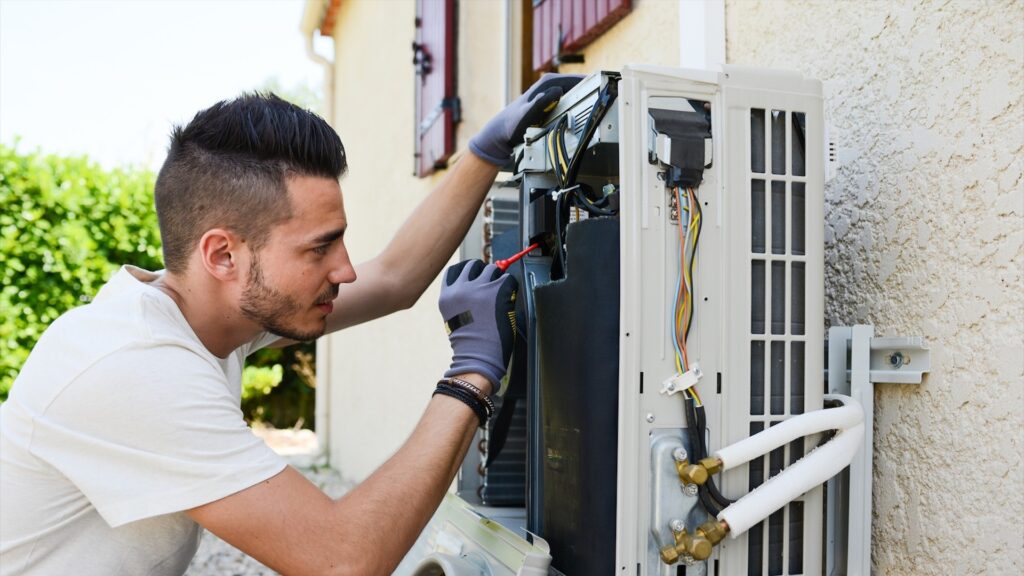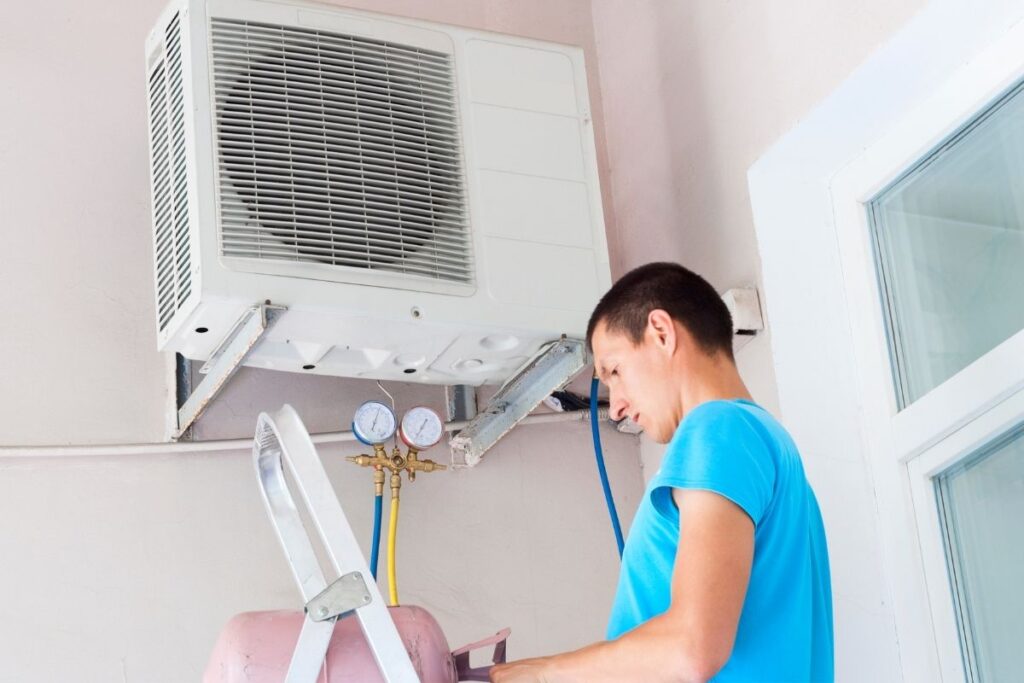AC Repair Near You: Your Ultimate Guide to Staying Cool
When your air conditioner breaks down on a sweltering day, the last thing you want is to be stuck in a sea of technical jargon trying to figure out what to do. Finding a reliable AC repair service nearby can be a lifesaver. In this guide, we’ll walk you through everything you need to know about AC repair, from understanding common issues to finding the best service in your area.
Introduction
Your air conditioning unit is like a breath of fresh air on a hot summer day. But what happens when it stops working? Knowing how to handle AC issues can save you from discomfort and potentially expensive repairs. This guide will help you navigate the process of AC repair with ease.
Common AC Problems 
Understanding common AC problems can help you identify issues early and take action before they become major headaches.
Refrigerant Leaks
Refrigerant is crucial for cooling your home. If your AC is low on refrigerant, it might be due to a leak. Not only does this affect cooling, but it can also harm the environment.
Frozen Evaporator Coils
Your AC’s evaporator coils need warm air to circulate around them to work properly. If something goes wrong, these coils can freeze and stop functioning.
Dirty Condenser Coils
Located in the outdoor unit, condenser coils can get dirty over time. This reduces the efficiency of your AC and can lead to overheating.
Sensor Issues
AC units have a thermostat sensor that can get knocked out of position. This causes the AC to behave erratically, turning on and off at the wrong times.
Electric Control Failures
Frequent cycling of your AC can wear out the fan controls and compressor. This is especially common in units that are oversized for the space they are cooling.
Signs Your AC Needs Repair
It’s important to recognize the signs that your AC might need repair. Addressing these issues early can prevent further damage and save you money.
Poor Airflow
If you notice weak or no airflow through your vents, it could be a sign of a blockage or a failing compressor.
Warm Air
When your AC starts blowing warm air, it could be a sign of a problem with the compressor or low refrigerant levels.
Strange Noises
Unusual sounds like grinding, squealing, or rattling can indicate a mechanical issue inside your AC unit.
Unpleasant Odors
Foul smells could mean your AC’s insulation has become moldy or there’s a burnt wire somewhere in the system.
High Humidity
An effective AC not only cools but also removes humidity from your home. If you notice increased humidity, it might be time to check your AC.
DIY Troubleshooting Tips
Before calling a professional, there are a few troubleshooting steps you can try yourself.
Check the Thermostat
Ensure your thermostat is set to the correct temperature and mode. Sometimes, AC Repair Near You, the solution is as simple as replacing the batteries.
Inspect the Filter
A dirty air filter can restrict airflow and reduce your AC’s efficiency. Regularly check and replace your filters.
Clear the Area Around Your Outdoor Unit
Make sure there is no debris around your outdoor unit, AC Repair Near You, which can block airflow and cause overheating.
Reset Your AC
Sometimes, resetting your AC can solve minor issues. Check your user manual for instructions on how to do this safely.
When to Call a Professional
Knowing when to call in the experts is crucial. If the DIY fixes don’t work, it’s time to seek professional help.
Complex Electrical Issues
Electrical problems can be dangerous. If you suspect an electrical issue, AC Repair Near You, it’s best to call a professional.
Persistent Problems
If your AC issues keep coming back, AC Repair Near You, it might be time for a thorough inspection by a professional.
Refrigerant Leaks
Handling refrigerant requires special training and equipment. If you suspect a leak, call a certified technician.
How to Choose the Best AC Repair Service
Selecting the right AC repair service can be daunting. Here are some tips to help you make the best choice.
Check Credentials
Ensure the company is licensed, insured, and has certified technicians.
Read Reviews
Look for customer reviews online to get an idea of the company’s reputation and service quality.
Ask for Recommendations
Word of mouth is powerful. Ask friends, family, or neighbors for recommendations.
Get Multiple Quotes
Don’t settle for the first quote you receive. Getting multiple quotes can help you compare prices and services.
Cost of AC Repair
The cost of AC repair can vary widely depending on the issue and your location. Here are some factors that can influence the cost.
Type of Repair
Simple fixes like replacing a filter are inexpensive, AC Repair Near You, while major repairs like fixing a refrigerant leak can be costly.
Labor Costs
Labor costs can vary depending on the technician’s experience and the complexity of the repair.
Parts and Materials
The cost of replacement parts and materials can also affect the overall repair cost.
Preventive Maintenance Tips
Regular maintenance can prevent many common AC problems and extend the life of your unit.
Schedule Annual Check-Ups
Having a professional inspect your AC annually can catch issues early before they become major problems.
Keep the Unit Clean
Regularly clean the outdoor unit and ensure the area around it is free of debris.
Replace Filters Regularly
Replacing your air filters every 1-3 months can keep your AC running efficiently.
Energy Efficiency Tips
An efficient AC can save you money on energy bills and reduce your environmental impact.
Use a Programmable Thermostat
A programmable thermostat can help you manage your cooling needs more efficiently.
Seal Your Home
Ensure your home is well-sealed to prevent cool air from escaping and warm air from entering.
Upgrade Your AC
If your AC is old and inefficient, consider upgrading to a newer, more energy-efficient model.
The Importance of Regular Check-Ups

Regular check-ups are vital for the health of your AC. They can prevent unexpected breakdowns and ensure your unit runs efficiently.
Extend the Lifespan
Regular maintenance can extend the lifespan of your AC unit, saving you money in the long run.
Improve Air Quality
A well-maintained AC can improve the air quality in your home by filtering out dust and allergens.
Enhance Performance
Regular check-ups ensure your AC is performing at its best, providing you with consistent comfort.
Frequently Asked Questions
What should I do if my AC is not cooling properly?
First, check your thermostat and air filters. If these are not the issue, it might be time to call a professional.
How often should I replace my AC filters?
It’s recommended to replace your AC filters every 1-3 months, depending on usage and air quality.
Why is my AC making strange noises?
Strange noises can indicate various issues, from loose parts to a failing compressor. It’s best to have a technician inspect your unit.
Can I repair my AC myself?
While some minor issues can be fixed by homeowners, most AC repairs should be handled by professionals to ensure safety and effectiveness.
How can I improve my AC’s efficiency?
Regular maintenance, using a programmable thermostat, AC Repair Near You, and ensuring your home is well-sealed can all improve your AC’s efficiency.
Conclusion
Dealing with a broken AC can be stressful, but understanding common problems and knowing when to call a professional can make the process much smoother. By following the tips and advice in this guide, you’ll be well-prepared to handle any AC issues that come your way and keep your home cool and comfortable all summer long.
